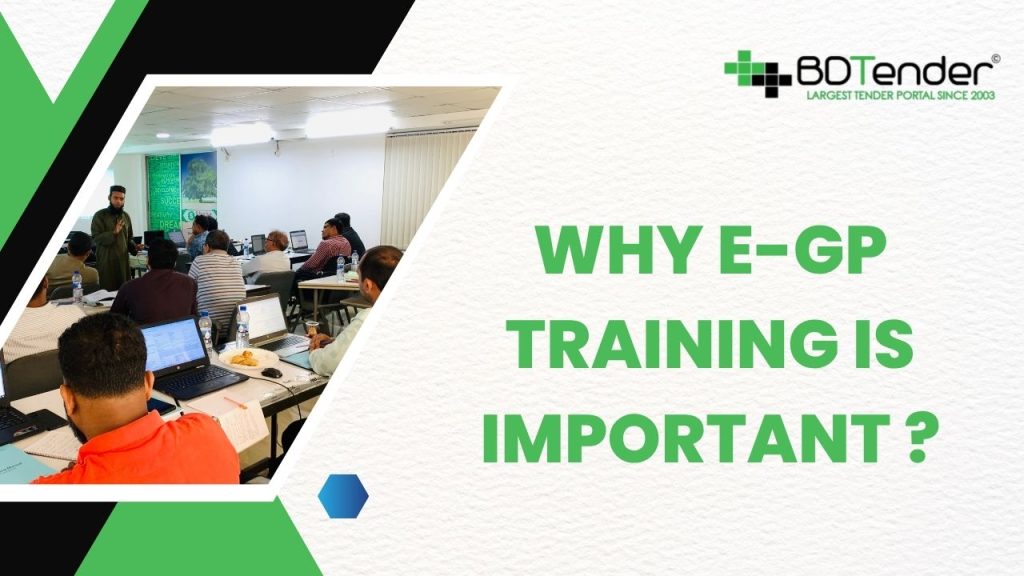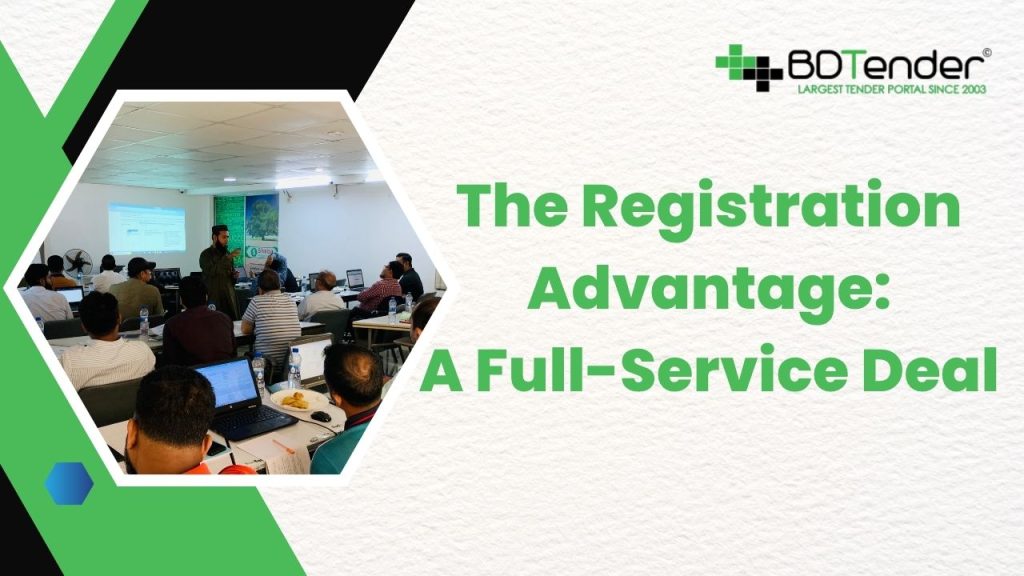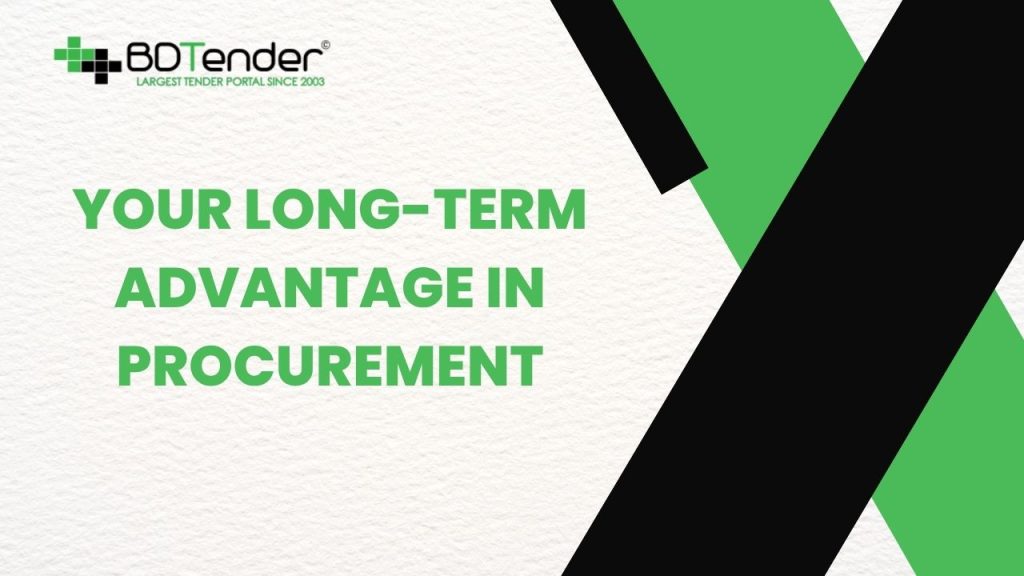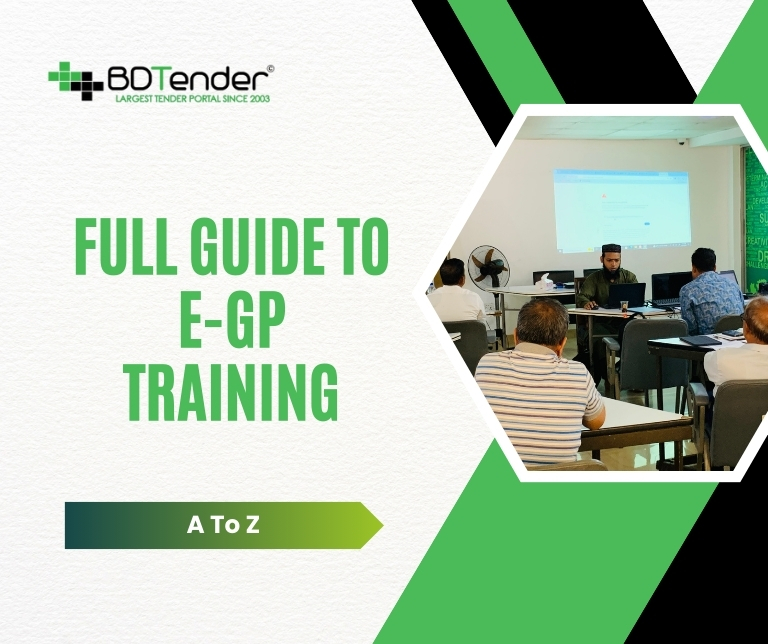e-GP Training in Bangladesh kicks off by visiting the core e-GP Training of Government, where government contracts are now fully digital. To level up, you’ll want hands-on sessions via BDTenders e-GP Training, where real experts help you apply what you learn from the government portal.
In Bangladesh, the way government contracts are awarded has changed quietly as the public procurement landscape has changed. The adoption of electronic Government Procurement (e-GP) has made a process that used to be slow and full of paperwork faster, easier to understand, and more open. More and more, contractors, suppliers, and consulting firms realize that knowing how to use the e-GP portal Bangladesh is not just a plus; it’s necessary. As purchases move online, those who are ready do well, but those who are behind have a hard time keeping up.
But moving to electronic tendering comes with its own set of problems. It seems easy to figure out how to log in, read tender notices, submit bids, and sign documents electronically, but when you run into the confusing portal interface, strange document formats, or sudden conceptual roadblocks like JVCA or performance security, it can be hard. That’s why one of the best ways to turn access into real success is to pay for formal e-GP Training with experienced professionals.
What is e-GP and why is it important in the digital transformation?
Simply put, Electronic Government Procurement (e GP) is the most important part of Bangladesh’s modern tendering system. The Central Procurement Technical Unit (CPTU) pays for it. It puts the whole public procurement process online, from posting notices and opening tenders to submitting bids, evaluating them, awarding contracts, and signing them. The government has made things much more open, lowered the risk of corruption, and sped up the process by putting all of these tasks on a secure, auditable, and publicly accessible platform. You can explore this system directly on the official government portal at www.eprocure.gov.bd
This system gives contractors and suppliers who can adapt quickly a unique edge over their competitors: they can get information faster, get bid confirmations right away, and use ready-made systems to send in their tender documents. But just having access isn’t enough. Knowing what e-GP is is one thing, but actually making an e-GP account, understanding tender criteria, writing bids digitally, or meeting post-award obligations all require a full understanding of the e tender process. That’s why many professionals turn to www.egp-training.bdtender.com for expert-led support.

Many people who work in procurement try to learn on their own by reading manuals or the FAQ section of the portal. Sadly, these resources don’t always go far enough. There is a lot of jargon in e-GP tender notice, e-GP tender opening, OTM and LTM tender submission, as well as the details of JVCA and sub-contracting, performance security, and signing a contract. It’s easy to get the wrong idea about rules, miss out on bidding opportunities, or not attach documents correctly if you don’t have clear instructions. Mistakes can cost a lot of money and time.
That’s when formal training comes in. A good e-GP Training course teaches you not only how the system works, but also how to bid strategically, how to upload documents correctly, and what to do after you’ve submitted your bid. It starts with the basics: talking about public procurement training, explaining why tender cycles exist, and making it clear what kinds of tenders are OTM (Open Tendering Method) and LTM (Limited Tendering Method). Next, it goes over how to do things like visit the official portal, create a supplier account, finish the eGP registration process, log in, find relevant tenders by using the menus and dropdowns, and more. When participants ask, “How do I make an eGP account?” trainers walk them through every step of the process, from uploading their TIN, BIN, trade license, bank solvency, NID, VAT certificate, and more to make sure their application passes validation without any problems.
From there, the training goes deeper: tender notices are looked at line by line, qualifiers are found, JVCA specifics are taught, and hidden problems (like document names that don’t match or ZIP uploads that are too big) are pointed out. Most importantly, people need to learn how to submit a tender in e-GP by practicing it in real time.
Experiencing the Process: Live Modules for Submitting Tenders
It’s one thing to watch portal tutorials; it’s another to do them live. Participants are shown how to submit live tenders, usually two OTM tenders one for product supply and one for works contracts and one LTM tender submission. The process goes from choosing the tender to checking eligibility, uploading eligibility documents, entering pricing proposals, uploading ZIP files, and making payment. This hands-on experience is very important. Slow document uploads, password resets, bank payment errors, and timeouts are just some of the problems that happen during live sessions. Having trainers help in real time makes these problems easier to understand, builds confidence, and makes sure that mistakes don’t stop the application from going through at important bidding times.
The Expert Trainers: Leading to Success
Experienced mentors are needed for this kind of immersive training. BDTender does this with the help of two well-known experts: Engineer Tasnim Sultana and Engineer Md. Mizanur Rahman. Tasnim has run tender portals for more than ten years, handling everything from school project tender notices to big civil works. Her practical advice, like making sure your scanned documents meet portal requirements or showing you how to fill out a JVCA form correctly, is priceless. Engineer Mizanur Rahman is the national eGP trainer for LGED and a procurement expert who works on World Bank projects. He provides strategic oversight. He helps students understand the rules for public procurement, prepare for changes to the portal, and deal with more complicated types of tenders. His more than fifteen years of experience coordinating high-value bids and joint ventures gives students a strong base in advanced tendering.
They teach students how to do things and why they do them. Their combined knowledge makes sure that students leave with both technical skills and strategic procurement knowledge.
Flexible Learning: Models for Learning in Person and Online
BDTender offers both online and offline training formats that are equally full of information and experience. This is because the participants can be urban contractors, rural suppliers, busy professionals, or remote learners.
In-person sessions happen in a modern classroom. Participants gain from being able to talk to each other, getting help from the trainer right away, getting free printed course materials, and being in a climate-controlled space. There are live tender demos on screen, and there are also interactive Q&A sessions to make sure everyone is on the same page. These sessions also include free lunch, which gives students a chance to talk about things with their trainers and classmates in a relaxed setting.
The online version uses Google Meet to deliver the same detailed curriculum to people who can’t commute. Training videos, portal walkthroughs, Q&A, and downloadable PDFs are all part of the nightly sessions. Even though people join from home or work, the virtual room feels like a real community and has the same depth as a real-life group. At the end, each student gets an e-GP certificate, which is a real way to show how well they did.

BDTender offers more than just training; they offer a full package that helps people turn what they learn into real-world practice. The e GP registration service, which is a very important first step, costs ৳9,990 (VAT included). Participants just pay, send in scanned copies of their trade license, tax documents, NID, and other documents, and the expert team finishes the registration in three business days. A well-formed supplier account lowers the risk of roadblocks in future bidding.
In the same way, the tender submission services are like real-life training:
- The LTM tender submission service (৳200 VAT) lets people email their tender ID and account information and have experts help them with the submission or do it themselves.
- The OTM submission service (৳950 plus VAT) comes with a consultation before the submission, help with uploading bids, and follow-up services.
- Preparing tender documents (৳950 VAT) makes professionally formatted proposals that meet the standards for portals and eligibility.
These services let graduates use what they learned right away or get help from outside sources when they need it, which makes them better at turning knowledge into contracts. The e-GP registration service is one of the most useful extras. It’s the first step for anyone who wants to take part in government procurement. Participants can pay a one-time fee and send in the required documents, like their trade license, tax identification, NID, and bank solvency certificate. The expert team at BDTender will then take care of the whole registration process. A fully activated supplier account is ready in just a few business days. This solves one of the biggest problems that new bidders have. This makes sure that students are not only trained but also ready to start tendering right away.
BDTender not only lets you register, but it also lets you submit tenders, which is a natural next step after training. The LTM tender submission service was made to be easy to use. People who want to submit a tender can give the support team their tender ID and login information. The support team will either help them through the process or do it for them. It’s a good choice for people who are new to something and need a little more help. The OTM submission service includes a one-on-one consultation, help uploading the entire bid, and support after the bid is submitted to make sure nothing is missed for more complicated bids. There is also a service for preparing documents that makes sure that professionally written tender documents meet the portal’s technical and eligibility standards. These optional services are especially helpful for people who want to use the skills they just learned without having to deal with all the stress on their own.
BDTender makes sure that every graduate has everything they need to put their training into action and move forward with confidence in the digital procurement space, whether they choose to do it on their own or ask for help.
From the Trainee’s Point of View: Confidence, Clarity, and Coverage
The best way to see how the e-GP Training program really affects people is to look at what people who have finished it have to say. Many people who take the course feel overwhelmed by the technical details of the e-GP portal. At first, they think the system is hard to understand because it has dropdown menus, strict document formats, and tight deadlines for submissions. But soon they get used to it and can handle it. With the right training and practice, the portal goes from being a source of stress to a useful tool that they can easily use.
Feedback from people who have trained with us in the past shows that their understanding and confidence have changed a lot. They often talk about how the training helped them feel more at ease logging in and moving around the portal’s different sections. It is much easier to understand complicated tender notices that used to be full of legalese and vague requirements. Participants learn how to plan ahead, keep track of deadlines, and avoid common mistakes when submitting their work that could cost them valuable chances. Another area of change is their ability to correctly prepare and submit performance securities. They also learn how to handle joint venture requirements and sub-contracting processes, which are two things that new bidders often get wrong. They also learn exactly what happens after they submit a successful tender, such as finalizing the contract and getting the project started.
Live tender submission practice is one of the most empowering parts of the training. This hands-on experience gives students more than just book learning; it also leads to real submissions, confirmations, and uploads. These real results help people learn and give them confidence. When people leave with successful submissions, they no longer feel like beginners. Instead, they leave the training ready to take part in the government procurement process with skill, clarity, and a new sense of purpose.
Using common sense to get through problems
It’s not hard to get to the e-GP portal, but using it well and with confidence takes more than just a login ID. The system can be hard to understand, especially for people who are new to it. Even experienced bidders often run into problems that slow them down or cost them money. One common problem is formatting. Tender documents have to be a certain size and have a certain name, and even a small mistake can stop them from being submitted. The timing is also very important. A lot of people wait until the last minute to submit their bids, only to find that the portal is slow or has technical problems that can stop the whole process. Another problem is that you need to properly document joint ventures, which is called JVCA. If the paperwork isn’t filled out correctly or uploaded on time, the bid could be thrown out right away. It’s also important that the documents are real; certificates that are old or wrong can lead to rejection. If you forget your password or can’t get into your account, help from the portal may be limited and take a long time to get back to you. A structured e-GP Training program is useful here. It helps students avoid and fix these common mistakes before they turn in their work by combining expert instruction with practical support services. Trained bidders in Bangladesh’s digital procurement landscape are ready, confident, and much more likely to succeed than bidders who react under pressure.

Completing a full e-GP training program gives you skills that will be useful for a long time after you leave the classroom. It not only makes you better at using the e-GP portal, but it also gives you a strategic edge in Bangladesh’s very competitive public procurement market. If you get the right training, you’ll be able to submit tenders more accurately and consistently, which will save you money by avoiding mistakes and missed chances. This, in turn, makes you more likely to win and gives you more confidence as a bidder. Also, having a recognized e-GP certification makes you more trustworthy to both government agencies and private partners, making you look like a knowledgeable and reliable supplier. You’ll also learn how to make good joint venture (JV) and sub-contracting plans, which are becoming more and more important for bigger, more complicated tenders. e-GP training opens up new opportunities for government-funded and donor-backed projects for people who want to grow their careers or businesses. It even lets you become a consultant, helping other businesses through the e-GP process and bringing in more money.
As Bangladesh’s procurement process moves to fully digital platforms, people who aren’t trained will fall behind. By paying for e-GP training now, you’re not only preparing to take part, but also to lead.
Final Thoughts: The Road to Greatness
Public procurement is a field that is changing quickly and has many parts. It needs people to be clear, follow the rules, and think ahead. The use of the electronic Government Procurement (e-GP) system in Bangladesh is a big step toward meeting international standards for openness and efficiency in business. As traditional, paper-based systems go away, the government’s digital procurement platform is opening up new opportunities for suppliers, contractors, and consultants who are willing to change. People who take the time to learn and master the e-GP system get more than just access to tenders. They also get the tools they need to grow, compete effectively, and lower the risks of following procedures.
At first, the learning curve might seem steep, especially for people who aren’t used to working with digital tools. Every step of the procurement cycle, from figuring out what e-GP really means and how to sign up for the platform to confidently submitting bids and handling post-award steps, needs to be done with care and planning. This is when structured training becomes very useful. Instead of using random resources or making guesses, learners do better with a step-by-step method that includes everything from making an account and getting documents ready to practice how to submit a live tender.
Participants in BDTender’s complete training program, which includes expert-led instruction, real-world demonstrations, and optional support services, learn a lot more than just technical skills. They get an edge over their competitors. This training builds confidence, makes sure that tenders are accurate, and makes sure that procurement rules are followed. It also sets participants up for long-term success in projects that are funded by the government or by donations. Investing in e-GP training is a smart move that pays off in the long run, whether you’re just starting out or looking to grow your role in public procurement. It gets you ready not only to take part in digital procurement but also to lead the way in a future where credibility and efficiency are most important.
Are you ready to move on?
If you’re ready to change how you bid on contracts, the next step is easy: pick a format, get expert training, and get help that makes the portal process feel like second nature. Get in touch with the team to book your spot, ask questions, or talk about the possibility of working together. Make sure you’re ready to win, not just registered, before the next round of tenders opens.

